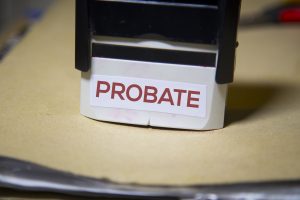Two Things You (and Your Parents) Should Do Now to Avoid Having the Family Home Go Through Probate

Family Home

Most people are going to own a piece of real estate throughout their lifetime. They may own the home they live in, have a vacation home, or have an investment property. Owning real estate is a dream most of us have. And many of us are fortunate enough to realize that dream. However, most of us do not think much about what happens to that real estate after we die. We may assume it will be passed on to our spouse or children. Some of us may also do a Last Will and Testament, which spells out exactly where the property will go after we die. Unfortunately, many people do not realize that having a Last Will and Testament does NOT on its own, avoid probate.
Let’s talk briefly about what probate is, why real estate goes through probate, and what we can do to avoid probate.
What is probate?
Probate is the legal process through which a person’s belongings are passed along to his or her beneficiaries after they have died. Basically, after a person has died, a probate is opened with the courts and the Judge will oversee a legal process to make sure that that person’s heirs receive their inheritance.
Why does real estate go through probate?
Generally speaking, a piece of property goes through the probate process so that those inheriting the property will have a marketable title. If the heirs want to sell the home, rent the home, take out property insurance on the home, or pay off the existing mortgage, they will need to put the property through probate.
Example: John Smith owned his primary residence. He had two children. John did not do any of the planning described below. He dies and now his two children want to sell the property. The property is legally owned by The Estate of John Smith. Even though John’s two children are the legal heirs and will ultimately become owners of the property, before they can sell it, they must do a probate.
How can you avoid having your property go through probate?
Most probates that we do are smooth and there aren’t any issues. But still, probate takes time and money and there are times when siblings start fighting and all hell breaks loose. So, knowing that, why don’t people try and avoid it? Honestly, I think most people don’t want to think about dying. A lot of people also think that their family is very close, and they’re not worried about everyone fighting. Well, our law firm, Stivers Law, has done hundreds of probates and I can tell you that I bet some of those people who said that there is no way their family would fight after they die, would be shocked (in a bad way) to see how not spending a few bucks could have spared their family from years of fighting.
So, what can you (and your parents) do to avoid having your real estate go through probate?
#1 Create a Trust
A Trust is a document, similar to a Last Will and Testament, which says what happens to your things after you die. With a Trust, you can essentially create a new deed for your property which names the Trust as the owner of the property. Using the example above: let’s say that John Smith had a Trust called the “John Smith Family Trust.” After this Trust is created, he deeds his property over to the Trust so that his primary residence is now owned by the John Smith Family Trust. The Trust itself will likely say what he wants to happen with this property. For example, it may name his son as the Trustee (the person in charge of managing the Trust) and instructs the son to sell the property and split the proceeds between himself and his daughter. So now, when John dies, his two children will not have to go through probate. The property has a marketable title because it was placed in a Trust and they can sell the property right away.
This is the major difference between a Last Will and Testament and a Trust. A Last Will and Testament does NOT by itself, avoid probate. A Last Will and Testament basically just says who gets what of your things. However, even if John said in his Last Will and Testament that his property would be left to his son, if John only had a Last Will and Testament, his property would still go through probate before his son could sell it.
#2 Change the Deed
As a general rule of thumb, the deed takes priority over everything else. So, if you have a Last Will and Testament that leaves the property to one person, but the deed lists another person as the owner; the deed is what matters. One of the easiest ways to avoid probate is to change the deed while you are still alive so that the property does not have to go through probate in order to transfers ownership. One way is to change the deed to the name of a Trust which we discussed above. Another way is to do a deed with Joint Tenants with Right of Survivorship (JTROS). Note – each state is specific so you will want to consult with your local attorney before trying to draft your own deed and this may not apply to all states.
Joint tenants with right of survivorship basically is a way to put multiple people on the deed. When one of the persons on the deed passes away, their ownership rights automatically pass to the living owners still on the deed. Quick example: let’s say that there are two individuals on a deed and they each own equal percentages of the property. The deed would say something like: “Susan Ethridge and Dan Gonzalez as joint tenants with right of survivorship.” This means that both Susan and Dan each own 50% of the property. If Susan dies, her 50% automatically passes to Dan, and Dan now owns 100% of the property. Similarly, if Dan dies, his 50% automatically passes to Susan and Susan now owns 100% of the property.
However, if the deed said: “Susan Ethridge and Dan Gonzalez as tenants in common,” then if either Susan or Dan were to die, their interest in the property would be owned by their estate and probate would be necessary. For example: if Susan dies and they owned the property as tenants in common, now the property would be owned 50% by the Estate of Susan Ethridge and 50% by Dan Gonzalez. A probate would need to be opened for the Estate of Susan Ethridge and Dan could never sell the property or do anything with it until the probate is done.
So, this is why the JTROS is a very popular option for people looking to avoid probate. This option is not without its limitations but if you are thinking about how to avoid probate, this is certainly an option to explore.
Conclusion
Honestly, probate is very easy to avoid. Unfortunately, planning for the inevitable (i.e., death) is just not something we want to think about, and we are all too busy doing other things. However, as a probate attorney, I can say that while probate is generally a smooth process, there have been families ripped apart due to a lack of planning. Speak with your parent, or if you are the parent, think about doing this for your children. Your children may be best friends now and you may never think that anything could tear them apart. And chances are, probate will not cause a strain on their relationship, but you can still save them a lot of time and money of having to deal with it by spending a few hours and planning for your and their future.
If you want more information like this, please sign up for our free e-newsletter located at the bottom right of this page. Stivers Law is based out of Miami, Florida but we handle probate matters across the state of Florida. Please follow us on Facebook and message us if you have any questions.



